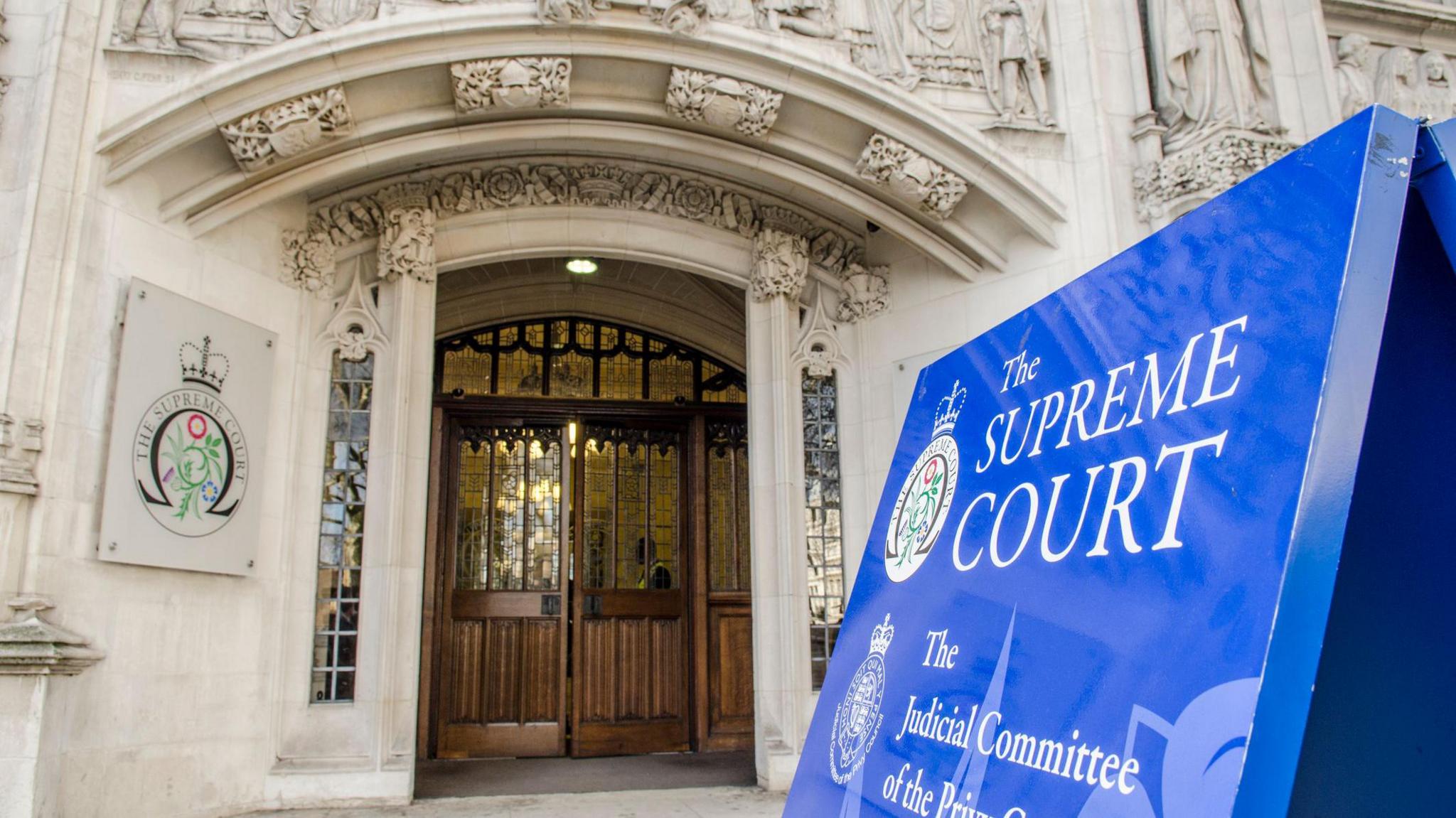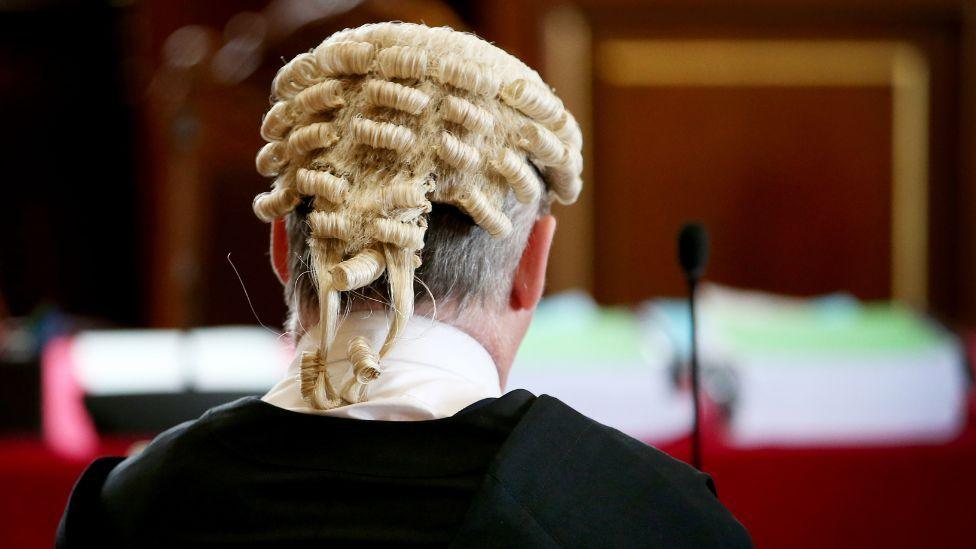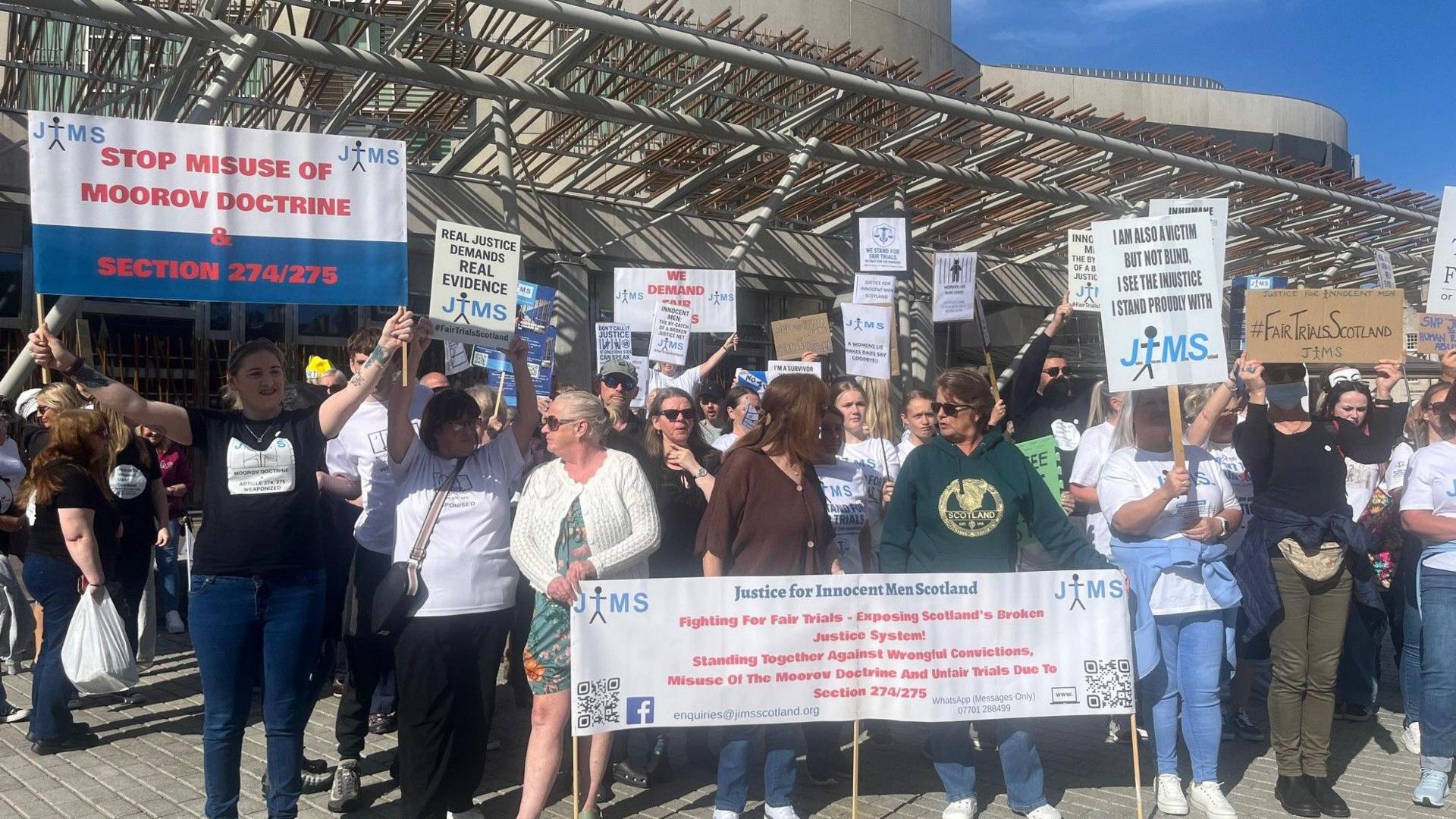Judges say Scottish courts are risking right to fair trial in sex cases

The UK Supreme Court issued its ruling on two appeals
- Published
A landmark ruling by the UK Supreme Court could trigger multiple legal challenges by men convicted of sexual offences in Scotland.
Five judges have ruled that Scotland's courts have taken an approach to evidence which risks depriving a defendant of their right to a fair trial.
The Supreme Court had been considering the case of two men, David Daly and Andrew Keir, who were appealing against convictions for rape.
The court dismissed their appeals and said they had received fair trials – but ruled that Scotland's courts should change their approach to the admission of evidence in such cases.
That is expected to result in claims that some cases dating back to 2017 were miscarriages of justice, although it's impossible to say exactly how many will reach the appeal court or whether they will be successful.
Daly and Keir had argued that their right to a fair trial was infringed because they were unable to lead evidence or question the complainers about their credibility or previous sexual behaviour.
While rejecting their appeals, the Supreme Court said the courts had a duty to modify their approach to be compatible with Article 6, external of the European Convention on Human Rights.
The Law Society of Scotland welcomed the judgement but Rape Crisis Scotland described the ruling as "a real step backwards".
Scotland's not proven verdict to be scrapped as MSPs back reforms
- Published17 September
Why was Scotland's not proven verdict abolished?
- Published17 September
Scottish judges remove barrier for rape cases going to court
- Published30 October 2024
There have been attempts in recent years to tackle long-standing concerns over the low conviction rate in rape and sexual offence cases.
The Supreme Court said evidence about a complainer's credibility or previous or subsequent sexual behaviour was almost always excluded from trials for sexual offences in Scotland.
It said this approach "is liable to result in violations of defendants' rights to a fair trial under article 6 of the Convention", which guarantees that a defendant can present a full defence to the charges they face.
"To do this, the defendant needs to be able to call evidence to establish his defence and to challenge the evidence called by the prosecution," said the Supreme Court.
"Excessive restrictions on the evidence or questioning which may be led at trial can therefore be incompatible with the right to a fair trial."
Intrusive questions 'inevitable'
The judges said that to enable a fair trial to take place, it may be "inevitable" that a complainer would have to be asked some intrusive questions.
"In our adversarial criminal justice system, by pleading not guilty, the defendant is necessarily challenging the complainer's version of events," said the ruling.
"The defence should consequently be able to seek to undermine the credibility of the complainer's testimony, and to rely on evidence of her behaviour, sexual or non-sexual, before or after the events in question if it is relevant to the question of consent."
The judges also said that the interests of complainers were "important and must be given proper weight".
"The law must therefore ensure that any intrusion into a complainer's privacy is no more than is necessary to ensure that the defendant receives a fair trial," they said.
"The courts should not allow the jury's fact-finding process to be distorted by the admission of evidence whose probative value to the defence is outweighed by the risk which its admission presents to the proper carrying out of that process."

The Law Society of Scotland's president, Patricia Thom, said Scotland had worked hard to ensure complainers in sex offence cases were protected "from unjustified intrusive questioning" while also upholding the accused's right to present a full and proper defence.
But she said that in recent years, many in the legal profession had "become concerned that the approach in some cases did not reflect that intended by parliament, resulting in accused persons being denied the right to present potentially relevant evidence at trial.
"It is now clear that Scottish courts will need to revise their approach in these cases and return to the system agreed by the UK and Scottish Parliaments, giving trial judges greater discretion to decide what questions may or may not be asked."
Sandy Brindley, chief executive of Rape Crisis Scotland, said it was a "real relief" that the appeal cases had been rejected - but voiced concerns over the comments in the judgement.
She said: "There is a real worry that this could lead to more appeals happening, and that can be really frightening and anxiety-provoking for survivors.
"The possibly of having your sexual history dragged up in court really could put women off reporting.
"I think there is a real worry about what does this mean for future cases and women's confidence in the justice process in Scotland."
She said the move was a "real step backwards" and that a complainer's right to privacy must be considered as well as the right to a fair trial.
A Scottish government spokesperson said they noted the ruling and were working with criminal justice partners to understand the impact of the judgement.
The spokesperson said: "The law, rightly, has provisions in place to protect complainers in sexual offences cases from irrelevant, intrusive questioning about their sexual history or character within the context of ensuring a fair trial to the accused."
Tony Lenehan KC, vice dean of the Faculty of Advocates, said: "I don't think it's a seismic change.
"Juries were not being trusted to use their common sense.
"The judgement today allows judges greater freedom to say to the jury, you are trusted now to look at these facts but we'll give you guidance on how you can use them, and how you must not abuse those facts."
Related topics
- Published9 September
